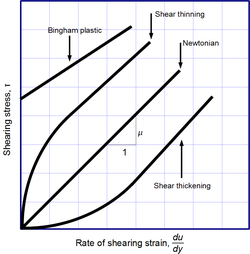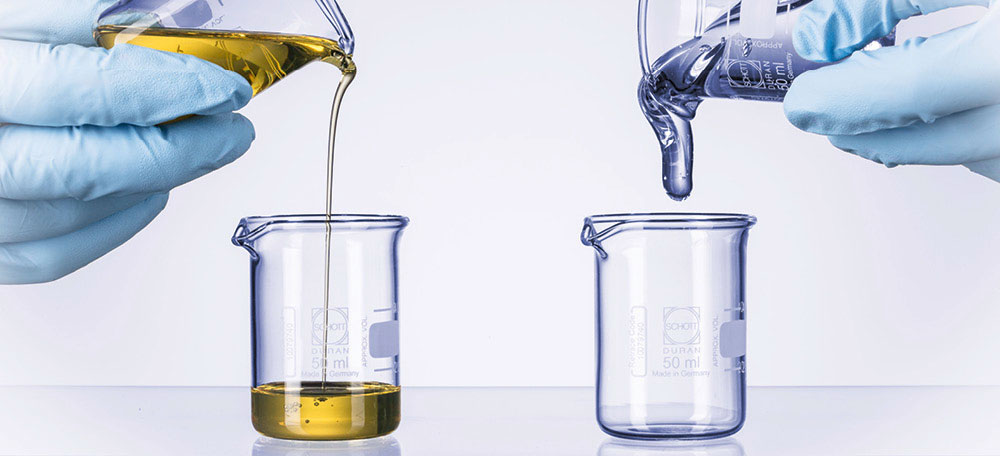What is Viscosity? Factors, Newton’s Law, and Importance of Viscosity in Various Industries
Viscosity refers to a property of fluids that characterizes their resistance to flow and determines their thickness. This property is determined by the internal friction within a fluid that acts to oppose the relative motion of its different layers. Fluids with high viscous levels have a greater resistance to flow and move more slowly when subjected to a force. Conversely, fluids with low viscous levels are less resistant to flow and move more quickly.
In physics, it is expressed as a fluid’s dynamic viscosity and is usually measured in units of Pa·s (Pascal-seconds). Examples of fluids with high viscous levels include honey, molasses, and motor oil, while fluids with low viscous levels include water and gasoline.
It has a significant impact on various engineering and industrial applications, such as fluid dynamics, heat transfer, and lubrication. A thorough understanding of viscosity and the ability to control it is essential in these fields in order to optimize performance and enhance efficiency. By controlling the viscosity of fluids, engineers and industrial professionals can regulate the flow and movement of liquids in a way that suits their specific needs and requirements.
Factors Affecting
There are several factors that can influence the viscosity of a fluid. Some of the most important factors include:
- Temperature: The temperature of a fluid has a significant effect on its viscosity. Generally, increasing the temperature of a fluid will decrease its viscosity, while decreasing the temperature will increase its viscosity. This relationship is due to the thermal energy of the fluid molecules, which affects their movement and intermolecular interactions.
- Pressure: Pressure can also influence the viscosity of a fluid. Increasing the pressure on a fluid can increase its viscosity, while decreasing the pressure can decrease its viscosity.
- Concentration or composition: The composition or concentration of a fluid can have a significant effect on its viscosity. For example, adding solutes to a fluid can increase its viscosity, while removing solutes can decrease its viscosity.
- Shear rate: The shear rate, or rate of deformation, of a fluid can also impact its viscosity. Fluids with high viscosity will have a low shear rate, while fluids with low viscosity will have a high shear rate.
- Intermolecular forces: The strength and nature of the intermolecular forces within a fluid can also affect its viscosity. Fluids with strong intermolecular forces, such as hydrogen bonding, will have higher viscosities compared to fluids with weak intermolecular forces.
It is important to note that these factors can interact with each other, and that the viscosity of a fluid can be affected by a combination of these factors. Understanding the relationships between these factors and viscosity is critical for controlling and manipulating fluid properties in various engineering and industrial applications.
Newton’s Law of Viscosity
Newton’s law of viscosity, also known as Newton’s first law of viscosity, is a fundamental principle that describes the behavior of viscous fluids. It was first described by Sir Isaac Newton in 1687 and states that:
“The shear stress acting on a fluid layer is proportional to the rate of change of velocity of the fluid along the plane of the layer.”
In mathematical terms, Newton’s law of viscosity can be expressed as:
τ = μ * (du/dy)
Where: τ is the shear stress acting on a fluid layer, μ is the dynamic viscosity of the fluid, and (du/dy) is the rate of change of velocity of the fluid along the plane of the layer.

Newton’s law of viscosity is an important principle in the study of fluid mechanics and is used to describe the flow of viscous fluids. It forms the basis of many models and equations used to analyze and predict the behavior of fluids in various engineering and industrial applications, including heat transfer, lubrication, and pipeline flow.
It is important to note that Newton’s law of viscosity only applies to fluids that exhibit a linear relationship between shear stress and shear rate. This means that for many non-Newtonian fluids, such as shear-thinning or shear-thickening fluids, this law is not applicable, and other models and equations are required to describe their behavior.
Uses and Applications
Viscosity has a wide range of uses and applications across various fields, including:
- Fluid Dynamics: Viscosity is an important factor in the study of fluid dynamics, as it affects the flow of liquids and gases in pipes, containers, and other systems. Understanding and controlling it in fluids is critical in the design and analysis of fluid systems, including pipelines, pumps, and heat exchangers.
- Heat Transfer: Viscosity can also play a role in heat transfer, as it affects the flow of heat-carrying fluids in thermal systems. By controlling the viscosity of fluids in heat transfer applications, engineers can regulate the flow of heat, improving the efficiency and performance of these systems.
- Lubrication: It is also important in lubrication, as it affects the performance and efficiency of lubricants. High-viscous lubricants are typically used in high-load applications, while low-viscous lubricants are used in applications requiring low friction and high fluidity.
- Pharmaceuticals and Cosmetics: It is a critical factor in the formulation and production of pharmaceuticals and cosmetics. Products with the correct levels of it ensure proper delivery and performance, and can be used to control the release of active ingredients over time.
- Food and Beverage Industry: It is also important in the food and beverage industry, as it affects the texture and mouthfeel of food and drink products. By controlling it in ingredients, manufacturers can produce products with the desired texture and consistency.
- Petroleum Industry: In the petroleum industry, it is an important property of crude oil, as it affects the production and transportation of petroleum products. It can impact the flow of crude oil in pipelines and the efficiency of refining processes, and is used to classify different types of crude oil.
These are just a few examples of the wide range of uses and applications of viscosity in different fields. Understanding and controlling it fluids is critical for optimising performance and improving efficiency in these areas.
Uses in Specific Industries

Viscosity has a wide range of applications across various industries, some of which are discussed in detail below:
- Petroleum Industry: In the petroleum industry, it is an important property of crude oil, as it affects the production and transportation of petroleum products. The viscosity of crude oil can impact the flow of oil in pipelines and the efficiency of refining processes, and is used to classify different types of crude oil. To ensure efficient transportation, crude oil is typically blended with lighter hydrocarbons to reduce its viscous levels and increase its flowability.
- Food and Beverage Industry: In the food and beverage industry, it is an important factor in determining the texture and mouthfeel of food and drink products. The levels of it in ingredients, such as syrups, sauces, and soups, can be controlled to produce products with the desired texture and consistency. It can also play a role in product stability and preservation, as low-viscous liquids are more prone to oxidation and spoilage than high-viscous liquids.
- Pharmaceuticals and Cosmetics Industry: In the pharmaceuticals and cosmetics industry, it is a critical factor in the formulation and production of products. Products with the correct levels ensure proper delivery and performance, and can be used to control the release of active ingredients over time. For example, high-viscous gels are commonly used in topical medications, while low-viscous liquids are used in products such as mouthwashes and sprays.
- Lubrication Industry: In the lubrication industry, it is an important factor in determining the performance and efficiency of lubricants. High-viscous lubricants are typically used in high-load applications, while low-viscous lubricants are used in applications requiring low friction and high fluidity. It is also important in determining the stability and longevity of lubricants, as high-viscous lubricants are less prone to oxidation and are less likely to break down over time.
- Pulp and Paper Industry: In the pulp and paper industry, it is an important factor in the production of paper, as it affects the flow of fibers and fillers in the papermaking process. By controlling it in pulp suspensions, paper manufacturers can produce products with the desired strength, brightness, and smoothness.
These are just a few examples of the many industries where viscosity is an important factor. Understanding and controlling it fluids is critical for optimising performance and improving efficiency in these industries.
Conclusion
In conclusion, viscosity is a measure of a fluid’s resistance to flow or its thickness. It is a crucial property of fluids that affects the performance and efficiency of many processes across various industries, including the petroleum, food and beverage, pharmaceuticals and cosmetics, lubrication, and pulp and paper industries.

Newton’s law of viscosity provides a fundamental principle for describing the behavior of viscous fluids and forms the basis of many models and equations used in the analysis and prediction of fluid flow. The uses and applications are diverse and far-reaching, and understanding and controlling it in fluids is essential for optimising performance and improving efficiency in many fields.
Factors such as temperature, pressure, and the composition of fluids can affect their viscosity, and it is important to consider these factors when evaluating fluid behaviour. Its study continues to be an important area of research, with new technologies and techniques being developed to improve the accuracy and understanding of fluid flow.





